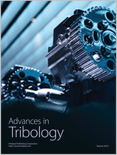
Advances in Tribology
Scope & Guideline
Exploring the Frontiers of Friction and Wear
Introduction
Aims and Scopes
- Tribological Performance Analysis:
The journal consistently covers research related to the analysis and improvement of tribological performance across various materials, including metals, composites, and coatings. This includes experimental studies and modeling approaches to understand friction and wear behavior. - Lubrication Studies:
A significant focus is placed on the evaluation of different lubricants, including synthetic, semi-synthetic, and bio-based oils, and their effects on wear and friction in mechanical systems. This encompasses both fundamental research and practical applications. - Material Development and Characterization:
Research on the development and characterization of new materials, particularly coatings and composites, is a core area. This includes studies on the properties of gradient coatings and the use of advanced materials like nano-particles to enhance tribological performance. - Experimental and Numerical Investigations:
The journal employs a variety of methodologies, including experimental testing and numerical simulations, to assess tribological behavior and optimize processes. This dual approach allows for comprehensive insights into tribological challenges. - Innovative Measurement Techniques:
Innovative techniques for measuring and modeling tribological interactions are frequently discussed, reflecting the journal's commitment to advancing measurement methodologies in the field.
Trending and Emerging
- Application of Statistical Methods:
The use of statistical methods, such as the Taguchi method, in optimizing tribological performance is increasingly prevalent. This trend reflects a growing interest in systematic approaches to improve material properties and reduce wear. - Sustainable and Bio-Based Lubricants:
There is a noticeable increase in research focusing on bio-additives and biolubricants. This shift is significant as it aligns with global sustainability goals and the need for environmentally friendly alternatives to conventional lubricants. - Advanced Coating Technologies:
Research on advanced coating technologies, particularly those involving detonation spraying and gradient coatings, is on the rise. These innovations are critical for enhancing the durability and performance of components in harsh operating conditions. - Dynamic and Nonstationary Friction Studies:
Emerging interest in dynamic processes and nonstationary conditions of friction indicates a trend towards understanding real-world applications and the complexities of tribological interactions under varying operational scenarios.
Declining or Waning
- Conventional Lubrication Techniques:
Research on traditional lubrication methods has decreased, possibly due to the increasing interest in alternative and more sustainable lubrication solutions such as bio-lubricants and advanced synthetic oils. - Basic Wear Mechanisms:
Studies focused solely on basic wear mechanisms without an integrated approach to materials or lubrication are becoming less common, as the field increasingly seeks to understand complex interactions in tribological systems. - Single-Factor Experimental Studies:
There is a noticeable decline in single-factor experiments in tribological research. The trend is moving towards multifactorial studies that consider various parameters simultaneously to provide a more holistic understanding of tribological behavior.
Similar Journals
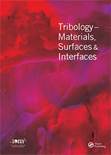
Tribology-Materials Surfaces & Interfaces
Transforming tribological insights into practical applications.Tribology-Materials Surfaces & Interfaces is a leading journal dedicated to advancing the field of tribology, leveraging insights into materials, surfaces, and interface interactions. Published by SAGE Publications Inc in the United Kingdom, this journal plays a pivotal role in disseminating high-quality research, providing a platform for both foundational and applied studies in mechanical engineering and materials science. With an impact factor reflecting its significance, ranking in the third quartile for both Materials Science and Mechanical Engineering, it caters to a diverse audience including researchers, industry professionals, and students. Although it currently does not offer open access, the journal endeavors to periodically review and publish innovative studies that enhance understanding of tribological phenomena, thereby contributing to the development of advanced materials and engineering solutions. Since its inception in 2007, Tribology-Materials Surfaces & Interfaces has consistently presented cutting-edge findings, thereby cementing its position as an essential resource for anyone engaging in tribological research.

Journal of Friction and Wear
Unraveling the Secrets of Material PerformanceJournal of Friction and Wear, published by PLEIADES PUBLISHING INC, is a pivotal resource in the field of mechanical engineering, with a particular emphasis on the study of friction, wear mechanisms, and their implications in various materials. With an ISSN of 1068-3666 and an E-ISSN of 1934-9386, this journal provides a platform for cutting-edge research and reviews that contribute significantly to our understanding in these areas. Although currently classified under Q3 in both Mechanics of Materials and Surfaces, Coatings and Films, the journal is making strides towards higher rankings, reflecting its growing influence as it publishes comprehensive analyses and innovative findings. Researchers and professionals can access vital studies, offering insights into improving material durability and performance, integral to numerous industries. This journal serves as a key reference point for students and scholars alike, supporting their quest for knowledge in the evolving landscape of material science.

Jurnal Tribologi
Unveiling innovative research in tribology and beyond.Jurnal Tribologi, published by the MALAYSIAN TRIBOLOGY SOC-MYTRIBOS, stands as a pivotal platform for research in the interdisciplinary field of tribology—focusing on the friction, wear, and lubrication of materials. Established in Malaysia and embracing Open Access since 2014, this journal serves a diverse readership and enables worldwide accessibility to cutting-edge research. With an ISSN of 2289-7232, it is indexed across various categories, achieving a commendable Q3 ranking in materials chemistry, mechanical engineering, and several other pertinent fields for 2023. The journal’s commitment to advancing knowledge in its domain is reflected in its circulation of valuable research findings and innovative methodologies, vital for both academic and industry professionals. Researchers, students, and practitioners alike will find Jurnal Tribologi an essential resource, advancing their understanding and application of tribological systems from 2019 to 2024 and beyond.

Tribology International
Pioneering Research in Friction, Wear, and Lubrication.Tribology International, published by ELSEVIER SCI LTD, stands as a premier journal in the fields of tribology, mechanical engineering, and material science. With an impressive impact factor and ranking in the Q1 category across multiple disciplines such as Mechanical Engineering and Surfaces, Coatings and Films, this journal serves as a critical resource for researchers, professionals, and students looking to advance their knowledge and application of tribological principles. Established in 1972, Tribology International explores a wide array of topics, including friction, wear, and lubrication, making it indispensable for those dedicated to innovation in engineering and materials sciences. With its rigorous peer-review process and high visibility within the academic community, Tribology International is pivotal in disseminating influential research, fostering new ideas, and shaping the future of tribological research.
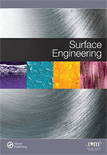
SURFACE ENGINEERING
Fostering Collaboration in Material Surface ResearchSURFACE ENGINEERING, published by SAGE Publications Inc, is a premier international journal dedicated to the advancement of knowledge in the fields of material surface science and engineering. With an ISSN of 0267-0844 and E-ISSN 1743-2944, this esteemed journal has been a critical resource since its inception in 1985, and continues to thrive through 2024. Recognized for its impactful contributions, SURFACE ENGINEERING achieves notable rankings in several categories including Q1 in Conservation and Q2 in key areas such as Condensed Matter Physics and Materials Chemistry. The journal serves a diverse audience of researchers, professionals, and students, providing them with insightful research articles, reviews, and technological developments that drive innovation in surface coatings, materials chemistry, and related disciplines. Although the journal follows a traditional subscription model, it remains an essential platform for disseminating crucial findings and fostering collaborations within the scientific community.
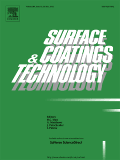
SURFACE & COATINGS TECHNOLOGY
Pioneering Research in Surface and Coating TechnologiesSURFACE & COATINGS TECHNOLOGY is a premier academic journal that has been at the forefront of research and innovation since its inception in 1986, diligently published by Elsevier Science SA. With an impressive range of studies focusing on surface and coatings technologies, the journal has established itself as a leading platform within the fields of Chemistry, Condensed Matter Physics, and Materials Science. Notably, it holds a distinguished Q1 ranking in multiple categories, showcasing its relevance and high impact in the academic community. Furthermore, it is recognized for its rigorous peer-review process and is indexed in esteemed databases, maintaining its strong position with a ranking of #17 in Surfaces, Coatings, and Films. Although the journal does not currently offer open access options, it continues to be a crucial resource for researchers, professionals, and students seeking insights into cutting-edge developments and applications in the domain of surface engineering. With a commitment to advancing knowledge across these disciplines, SURFACE & COATINGS TECHNOLOGY is an essential read for anyone interested in the latest trends and technologies shaping the industry.
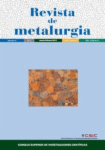
REVISTA DE METALURGIA
Unlocking the secrets of metals and alloys since 1968.REVISTA DE METALURGIA, published by the CONSEJO SUPERIOR INVESTIGACIONES CIENTIFICAS-CSIC in Spain, stands as a significant open-access journal since 1995 that focuses on the fields of condensed matter physics, materials chemistry, and the study of metals and alloys. With an ISSN of 0034-8570 and an E-ISSN of 1988-4222, this journal aims to disseminate innovative research findings and reviews that contribute to the understanding and advancement of metallurgical science. Although currently ranked in the fourth quartile across several relevant categories in Scopus, including Materials Science and Physics, its commitment to open access promotes the wider distribution of knowledge in these fields, ensuring that emerging findings are accessible to researchers, industry professionals, and students alike. The journal covers research from its earliest issues in 1968, maintaining a continuous archive that enhances its contributions to the scientific community. For those passionate about the complexities of material properties and behaviors, REVISTA DE METALURGIA serves as a platform for impactful scholarship and collaborative advancement.

Lubricants
Unlocking the potential of innovative lubrication solutions.Lubricants, published by MDPI, is a prestigious, peer-reviewed open-access journal that has been dedicated to advancing the field of lubrication technology since its launch in 2013. With its E-ISSN of 2075-4442, the journal is based in Switzerland and has rapidly established itself as a vital resource in the domains of Mechanical Engineering and Materials Science, achieving Q2 quartile rankings in both fields as of 2023. Lubricants provides a platform for the dissemination of innovative research, offering insights into the performance, formulation, and applications of lubricants across various industries. With a commitment to fostering collaboration and knowledge-sharing, this journal attracts a global audience of researchers, professionals, and students eager to explore the latest developments in lubrication technologies. Open access since its inception, Lubricants ensures that all published works are freely available, promoting greater visibility and accessibility of cutting-edge research in the field.
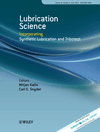
Lubrication Science
Driving collaboration in the field of tribology.Lubrication Science is a premier journal dedicated to advancing the field of tribology, focusing on the study and application of lubricants, lubrication methods, and their impacts in materials science. Published by WILEY, this journal serves as a critical platform for researchers and industry professionals alike, providing innovative insights and findings since its inception in 1988. With an ISSN of 0954-0075 and E-ISSN 1557-6833, the journal has established a commendable reputation in the academic community, holding a Q2 ranking in Materials Chemistry and a Q3 ranking in Surfaces, Coatings and Films as of 2023. Despite its recent emergence as a competitive publication, evidenced by its 47th percentile rankings in both subfields, Lubrication Science continuously seeks to bridge gaps in knowledge and foster collaboration among researchers. Its commitment to quality research is reflected in its detailed reviews and timely publication of original research articles. Although not an open-access journal, it remains an essential resource for anyone looking to keep abreast of the latest advancements and applications in lubrication technology, making significant contributions to sustainability and innovation in materials science.
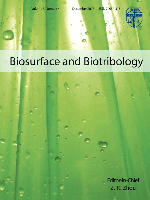
Biosurface and Biotribology
Fostering Collaboration in the World of Surface ScienceBiosurface and Biotribology, published by WILEY, is an innovative Open Access journal that has been dedicated to advancing the fields of biomaterials, biomedical engineering, and tribology since its inception. With a focus on the surface interactions and tribological behaviors of materials, this journal serves as an essential platform for researchers and professionals eager to explore the intersections of engineering, materials science, and biophysics. While it holds a current categorization in the Q4 quartile for biomaterials and biomedical engineering and a Q3 ranking in mechanical engineering, the journal's commitment to disseminating high-quality, peer-reviewed research contributes to its growing visibility and relevance in the academic landscape. With open access since 2018, it ensures that the latest research is freely available to all, fostering collaboration and innovation. Whether you are a graduate student, a seasoned researcher, or a professional in the field, Biosurface and Biotribology is your gateway to cutting-edge insights and developments that are shaping the future of biomaterials and surface engineering.